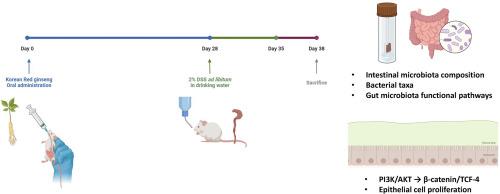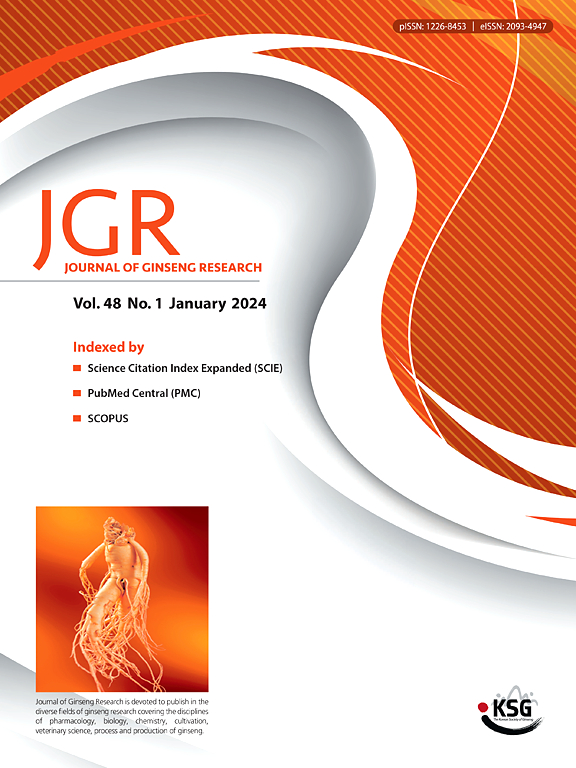Korean Red Ginseng alleviates dextran sodium sulfate-induced colitis through gut microbiota modulation in mice
IF 6.8
2区 医学
Q1 CHEMISTRY, MEDICINAL
引用次数: 0
Abstract
Background
There is a growing interest in understanding the association between the gut microbiota and inflammatory bowel disease (IBD). Natural compounds, such as Korean Red Ginseng (KRG), show promise for IBD treatment because of their ability to influence gut microbiota. This study explored the effects of KRG on gut microbiota modulation and subsequent intestinal epithelial cell regeneration in an experimental colitis model.
Method
Using a mouse model of colitis induced by 2 % dextran sodium sulfate, the study administered 200 or 400 mg/kg/day of KRG to evaluate its biological effects. Colitis symptoms were assessed through body weight, disease activity index, colon length, and histological analysis. The microbial composition in the fecal was determined using 16S rRNA sequencing. To evaluate regeneration signals in the colon, western blotting and immunohistochemistry assays were conducted.
Result
Administration of KRG effectively mitigated colitis symptoms in mice, as indicated by histological examination showing alleviated epithelial damage and inflammation, along with increased mucus production. Microbiota analysis showed that KRG significantly altered microbial diversity, favoring beneficial taxa and suppressing harmful taxa. Moreover, ameliorated β-catenin/transcription factor-4 protein expression, a key signal associated with epithelial cell regeneration, was observed in the KRG treated groups, accompanied by improved intestinal linings.
Conclusion
These findings suggest that KRG exerts biological effects in colitis by modulating gut microbiota and creating a favorable intestinal environment, thereby reducing regenerative signals. Further research is warranted to elucidate the cellular and molecular mechanisms underlying the interaction of KRG with gut microbiota and pave the way for effective IBD therapies.

高丽红参通过调节肠道微生物群缓解右旋糖酐硫酸钠诱发的小鼠结肠炎
人们对了解肠道微生物群与炎症性肠病(IBD)之间的关系越来越感兴趣。高丽红参(KRG)等天然化合物能够影响肠道微生物群,因此有望用于治疗 IBD。本研究探讨了高丽红参在实验性结肠炎模型中对肠道微生物群调节和随后肠上皮细胞再生的影响。该研究使用 2% 右旋糖酐硫酸钠诱导的小鼠结肠炎模型,每天服用 200 或 400 毫克/千克的 KRG,以评估其生物效应。通过体重、疾病活动指数、结肠长度和组织学分析来评估结肠炎症状。粪便中的微生物组成是通过 16S rRNA 测序确定的。为了评估结肠中的再生信号,进行了 Western 印迹和免疫组化检测。组织学检查显示,小鼠上皮损伤和炎症减轻,粘液分泌增加,因此服用 KRG 能有效缓解小鼠的结肠炎症状。微生物群分析表明,KRG 显著改变了微生物多样性,有利于有益类群,抑制了有害类群。此外,KRG 治疗组的 β-catenin/转录因子-4 蛋白表达得到改善,同时肠道内膜也得到改善。这些发现表明,KRG 通过调节肠道微生物群和创造有利的肠道环境,从而减少再生信号,对结肠炎产生生物效应。为了阐明 KRG 与肠道微生物群相互作用的细胞和分子机制,并为有效的肠道疾病疗法铺平道路,我们有必要开展进一步的研究。
本文章由计算机程序翻译,如有差异,请以英文原文为准。
求助全文
约1分钟内获得全文
求助全文
来源期刊

Journal of Ginseng Research
CHEMISTRY, MEDICINAL-INTEGRATIVE & COMPLEMENTARY MEDICINE
CiteScore
11.40
自引率
9.50%
发文量
111
审稿时长
6-12 weeks
期刊介绍:
Journal of Ginseng Research (JGR) is an official, open access journal of the Korean Society of Ginseng and is the only international journal publishing scholarly reports on ginseng research in the world. The journal is a bimonthly peer-reviewed publication featuring high-quality studies related to basic, pre-clinical, and clinical researches on ginseng to reflect recent progresses in ginseng research.
JGR publishes papers, either experimental or theoretical, that advance our understanding of ginseng science, including plant sciences, biology, chemistry, pharmacology, toxicology, pharmacokinetics, veterinary medicine, biochemistry, manufacture, and clinical study of ginseng since 1976. It also includes the new paradigm of integrative research, covering alternative medicinal approaches. Article types considered for publication include review articles, original research articles, and brief reports.
JGR helps researchers to understand mechanisms for traditional efficacy of ginseng and to put their clinical evidence together. It provides balanced information on basic science and clinical applications to researchers, manufacturers, practitioners, teachers, scholars, and medical doctors.
 求助内容:
求助内容: 应助结果提醒方式:
应助结果提醒方式:


